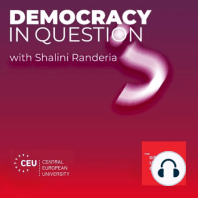26 min listen

Oleksandra Matviichuk on Human Rights and Ukraine
Oleksandra Matviichuk on Human Rights and Ukraine
ratings:
Length:
47 minutes
Released:
Feb 28, 2024
Format:
Podcast episode
Description
Democracy in Question? is brought to you by:• Central European University: CEU• The Albert Hirschman Centre on Democracy in Geneva: AHCD• The Podcast Company: scopeaudio Follow us on social media!• Central European University: @CEU• Albert Hirschman Centre on Democracy in Geneva: @AHDCentre Subscribe to the show. If you enjoyed what you listened to, you can support us by leaving a review and sharing our podcast in your networks! GlossaryEuromaidan and the Revolution of Dignity(05:36 or p.2 in the transcript)On November 21, 2013, one and a half thousand people rallied through social networks. They took to the Independence Square (Maidan Nezalezhnosti) to express their protest against pro-Russian President Viktor Yanukovych’s refusal to sign the association agreement between Ukraine and the European Union. At the same time, people in different cities of Ukraine gathered every day and organized events in support of European integration. On the night of November 29-30, about 400 activists, mostly students, remained on the streets of Kyiv. Armed fighters of the former police unit of the Ministry of Internal Affairs of Ukraine called “Berkut” forced people out of the square. They used explosive packages, beating people with batons and stomping them with their feet. Hundreds of thousands of people gathered in the center of Kyiv on December 1, 2013, to protest the forceful dispersal of peaceful protesters. Due to the European integration slogans, the events were called Euromaidan. This turned into a struggle for the renewal of the state system, the defense of democratic ideas, and the refusal to submit to the pro-Russian regime. The struggle became known as the Revolution of Dignity. Protesters occupied the building of the Kyiv City State Administration (KMDA) and the House of Trade Unions, where the Headquarters of the National Resistance were located. Independence Square and nearby streets were filled with protesters. Euromaidan activists began to set up tent cities, surrounded by barricades and several roadblocks. On December 8, 2013, the “March of Millions” took place in Kyiv, a public event with over a million participants. Activists decided to block the Presidential Administration and Government buildings. On the night of December 10-11, “Berkut” and units of internal forces launched an assault to disperse peaceful protesters. The impetus for the escalation of the confrontation was the adoption of “dictatorship laws” by the Verkhovna Rada of Ukraine on January 16, 2014. They limited the rights of citizens and expanded the powers of special officers to punish participants in protest actions. On January 19, Euromaidan started a move to prepare an open-ended picket of the Verkhovna Rada of Ukraine. The march met with units of internal troops and special units of “Berkut” on Hrushevsky Street — clashes began that lasted all night. Armed security forces used stun grenades and rubber bullets, as well as a water cannon, against the demonstrators. Euromaidan activists wore construction helmets, and they threw cobblestones and Molotov cocktails at the police. On January 22, 2014, another illegal decision was made to extend the powers of the security forces that acted against Euromaidan participants. They were allowed to use light noise and smoke grenades delivered from the Russian Federation. On this day, for the first time during the Revolution of Dignity, two activists – Armenian Serhii Nigoyan and Belarusian Mykhailo Zhiznevskyi – died from gunshot wounds on Hrushevsky Street in Kyiv. Hundreds were injured by rubber bullets, debris, and chemical burns. At the end of January, the uprising spread to other regions of Ukraine. Protesters occupied administrative buildings, and they removed pro-Russian heads of state administrations from their positions. On February 18, 2014, activists marched to the Verkhovna Rada of Ukraine, where deputies were supposed to consider changes to the Constitution of Ukraine. Activists called on the parliamen
Released:
Feb 28, 2024
Format:
Podcast episode
Titles in the series (78)
How does austerity politics weaken democracy? by Democracy in Question?